
Ornithology Research
Scope & Guideline
Advancing Knowledge in Ornithology and Conservation
Introduction
Aims and Scopes
- Avian Ecology and Behavior:
The journal emphasizes research on the ecological interactions and behaviors of birds, including feeding patterns, nesting habits, and social structures within diverse habitats. - Conservation Biology:
A core area of focus is the conservation of bird species, particularly those that are threatened or endangered, through studies that assess population dynamics, habitat requirements, and the effects of human activities. - Taxonomy and Systematics:
The journal publishes research that contributes to the taxonomy and classification of bird species, helping to clarify relationships among species and improve understanding of biodiversity. - Impact of Environmental Factors:
Research that investigates how environmental changes, such as habitat fragmentation, climate change, and urbanization, affect bird populations and their dynamics is a significant focus area. - Citizen Science Contributions:
There is a notable emphasis on studies that utilize citizen science data, showcasing the role of public participation in avian research and conservation efforts.
Trending and Emerging
- Urban Ornithology:
There is an increasing focus on how birds adapt to urban environments, including studies on species diversity, behavior, and conservation challenges in urban settings. - Climate Change Impacts:
Research addressing the effects of climate change on bird distribution, migration patterns, and habitat suitability is gaining prominence, reflecting the urgency of understanding these impacts for conservation. - Functional Ecology:
Emerging studies are exploring the functional roles of birds within ecosystems, including their contributions to seed dispersal, pest control, and nutrient cycling, highlighting their ecological importance. - Technological Advances in Research:
The use of technology, such as drones and bioacoustic monitoring, is becoming more prevalent in avian research, allowing for innovative approaches to studying bird behavior and ecology. - Citizen Science and Data Utilization:
The integration of citizen science into ornithological studies is on the rise, emphasizing the value of public engagement in collecting and analyzing avian data, which enhances research scope and outreach.
Declining or Waning
- Traditional Nesting Studies:
Research solely focused on basic nesting behaviors and characteristics has seen a decline, with a shift towards more integrated studies that consider ecological and environmental interactions. - Invasive Species Impact Studies:
Although still relevant, studies specifically addressing the impact of invasive species on bird populations appear to be less frequent, possibly reflecting a broader focus on habitat conservation and restoration. - Historical Ornithology:
Research that primarily documents historical records or long-term observations of bird populations without contemporary ecological context is becoming less common, as the journal encourages more dynamic and applied research.
Similar Journals

JOURNAL OF AVIAN BIOLOGY
Exploring the intricacies of avian ecology and behavior.Journal of Avian Biology, published by Wiley, is a leading journal in the field of animal science and zoology, with an impressive impact factor highlighting its significance in advancing our understanding of avian ecology and behavior. Since its inception in 1994, this journal has provided a vital platform for researchers, professionals, and students to share innovative studies and findings related to avian biology, contributing to a broader understanding of ecological dynamics and conservation strategies. Recognized in the Q1 category for Animal Science and Zoology and Q2 for Ecology, Evolution, Behavior and Systematics, it ranks 112th out of 490 in its primary field, demonstrating a strong percentile performance. The journal invites submissions that explore diverse aspects of avian research, fostering interdisciplinary discussions that are crucial for ongoing scientific inquiries. With both print and electronic formats, it maintains an accessible repository of knowledge for the global conservation community. Engage with the latest in avian studies through the Journal of Avian Biology and contribute to the evolution of this critical field.
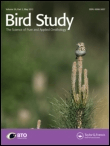
BIRD STUDY
Bridging the gap between science and avian conservation efforts.BIRD STUDY, an esteemed journal published by Taylor & Francis Ltd, stands at the forefront of avian research, contributing significantly to the fields of ecology, evolution, behavior, and conservation. With its ISSN 0006-3657 and E-ISSN 1944-6705, this journal has been a cornerstone of ornithological studies since its inception in 1954 and continues to provide a critical platform for the dissemination of knowledge through 2024 and beyond. It holds a respectable Q3 quartile ranking in both Ecology, Evolution, Behavior and Systematics and Nature and Landscape Conservation, reflecting its pivotal role in the academic community. While the journal is not open access, it continues to attract submissions from a diverse array of researchers and professionals eager to share their findings on the intricate and dynamic interactions of birds within their ecosystems. As the global focus on biodiversity and conservation intensifies, BIRD STUDY remains dedicated to fostering knowledge and encouraging evidence-based practices that aim to protect avian species and their habitats.

NOTORNIS
Illuminating the path of avian research and conservation.NOTORNIS is a prestigious academic journal published by the Ornithological Society of New Zealand, dedicated to advancing the field of ornithology and contributing meaningful research related to avian species. With ISSN 0029-4470 and E-ISSN 1177-7680, this journal has been a vital resource for scholars since its inception in 1982, continuously fostering discourse within the scientific community, particularly in the realms of animal science and zoology. Though it currently holds a quartile ranking of Q4, with a Scopus rank of #250 out of 490 in its category, NOTORNIS occupies a unique niche in ornithological research, promoting studies that highlight the ecological and biological intricacies of birds. This journal is critical not only to researchers and professionals in zoology but also to students and educators aiming to engage with contemporary avian research. As New Zealand's leading ornithological publication, NOTORNIS underscores the importance of avifaunal studies in conserving biodiversity and understanding ecological dynamics.

MALIMBUS
Exploring the wonders of West African birdlife.MALIMBUS is a peer-reviewed journal published by the West African Ornithological Society, focusing on the study of avian biology and conservation. It aims to disseminate important research findings that contribute to the understanding of bird species, their habitats, and the challenges they face across West Africa and beyond. Although currently not available in an open-access format, the journal is an invaluable resource for ornithologists, ecologists, and industry professionals keen on advancing their understanding of avian science. Those engaged in research on bird migration, breeding behaviors, and conservation strategies will find MALIMBUS to be a vital platform for sharing innovative ideas and fostering collaborations. With its commitment to quality and rigorous review processes, MALIMBUS is an essential reference for anyone dedicated to studying and preserving avian diversity.
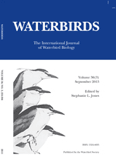
WATERBIRDS
Illuminating the World of Aquatic AvifaunaWATERBIRDS, published by the WATERBIRD SOC, serves as a vital scholarly resource in the field of Animal Science and Zoology. With its ISSN 1524-4695 and E-ISSN 1938-5390, this journal has established a significant presence since its inception in 1996, continuing to contribute valuable insights and research up to 2024. Recognized for its impact within the academic community, WATERBIRDS is currently positioned in the third quartile (Q3) for its category in 2023, ranking 335 out of 490 in Scopus's Agricultural and Biological Sciences sector, which underscores its role in promoting the study of avian species and their habitats. The journal is accessible to a wider audience, aligning with the growing demand for open access to scientific knowledge. By disseminating research that addresses both ecological and conservation issues pertinent to waterbirds, this publication serves as an essential platform for researchers, professionals, and students dedicated to advancing the understanding of avian biology and related fields.
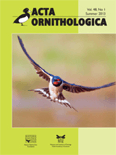
ACTA ORNITHOLOGICA
Uncovering the secrets of bird populations and their habitats.ACTA ORNITHOLOGICA is a prominent peer-reviewed journal dedicated to advancing the field of ornithology. Published by the MUSEUM & INST ZOOLOGY in Poland, the journal focuses on a wide array of topics related to avian biology, ecology, and conservation, supporting the dissemination of high-quality research aimed at understanding bird populations and their habitats. With a respectable impact factor reflected in its Q3 rank within the fields of Animal Science and Zoology, ACTA ORNITHOLOGICA stands as a reliable source for professionals and academics alike. The journal is indexed in major databases like Scopus, further contributing to its visibility and accessibility to scholars worldwide. Engaging with this journal provides researchers and students with invaluable insights and opportunities to contribute to the growing body of knowledge in ornithological studies as it continues to maintain its commitment to excellence and relevance in the scientific community from its inception in 1981.
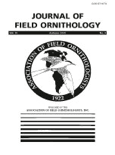
JOURNAL OF FIELD ORNITHOLOGY
Innovative Insights into Avian EcologyJOURNAL OF FIELD ORNITHOLOGY, published by the Resilience Alliance, is a premier academic journal dedicated to advancing knowledge in the fields of ornithology, ecology, and animal behavior. With an ISSN of 0273-8570 and a growing E-ISSN of 1557-9263, this journal has been a vital platform for researchers since its inception in 1996, continuing to publish cutting-edge studies up until 2024. The journal is recognized within the academic community, holding a Q2 ranking in Animal Science and Zoology and a Q3 ranking in Ecology, Evolution, Behavior and Systematics as of 2023. While the journal does not currently operate under an open access model, it remains a critical source for researchers, students, and professionals seeking to explore innovative research and discoveries in field ornithology. The diverse range of topics covered underscores its commitment to highlighting significant findings and fostering a deeper understanding of avian species and their ecosystems.
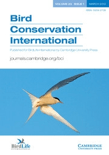
BIRD CONSERVATION INTERNATIONAL
Empowering conservation efforts with cutting-edge research.BIRD CONSERVATION INTERNATIONAL, published by Cambridge University Press, stands as a premier academic journal dedicated to the field of avian conservation and the vital ecological interactions that sustain bird populations worldwide. With an impressive impact factor reflected through its Q1 ranking in Animal Science and Zoology, alongside notable Q2 standings in Ecology and Nature and Landscape Conservation, this journal provides a crucial platform for researchers and practitioners committed to advancing the science and practice of bird conservation. Spanning articles from its inception in 1991 through to its future publications in 2024, BIRD CONSERVATION INTERNATIONAL not only fosters innovative research but also nurtures a global community dedicated to the preservation of avian species and their habitats. While currently not offering open access, it remains a cornerstone for scholarly communication in its field, making significant contributions to knowledge and policy shaping conservation efforts across the globe.
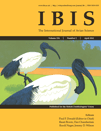
IBIS
Exploring the dynamics of nature and behavior.IBIS, published by WILEY, stands as a prestigious journal in the field of animal science, zoology, and ecology since its inception in 1859. With a focus on innovative research that informs the scientific community on ecological dynamics, behavioral studies, and conservation strategies, IBIS fills a critical niche for researchers, professionals, and students alike. The journal is recognized for its robust impact factor and commands a Q1 ranking in three key categories as of 2023, demonstrating its influence and reach within the global academic landscape, particularly in Animal Science, Ecology, Evolution, Behavior and Systematics, and Nature and Landscape Conservation. Although not an open-access publication, its rigorous peer-review process ensures high-quality contributions that advance knowledge in these vital areas. Through interdisciplinary collaboration and comprehensive coverage of cutting-edge topics, IBIS remains an essential resource for those striving to understand and protect our natural world.

ORNIS FENNICA
Unveiling the Secrets of Avian Behavior and ConservationORNIS FENNICA, published by BirdLife Finland, is a seminal journal dedicated to the field of ornithology and avian ecology. Established in Finland, this journal has been a vital resource for researchers, professionals, and students since its inception, evolving through converged publication periods from 1979 to 1985 and again from 1991 to the present. ORNIS FENNICA holds a Q2 category ranking in Animal Science and Zoology for 2023, indicating its significant influence and reputation within the academic community, as reflected in its Scopus ranking of 242 out of 490 in its field. The journal aims to promote the study of birds, encompassing aspects such as behavior, conservation, and biodiversity, thus serving as a crucial platform for disseminating innovative research findings. Although it is not open access, ORNIS FENNICA remains committed to advancing ornithological knowledge and supporting the scientific community's efforts to understand and protect avian species. For those invested in the nuances of bird research, this journal offers an invaluable repository of scholarly articles, reviews, and insights.